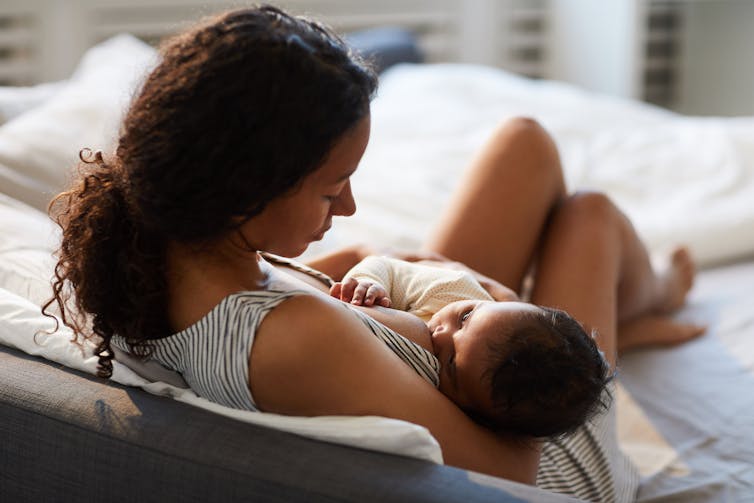If Babies Don't Produce Anti Bodies Why Are They Vaccinated
Although babies and immature children are at lower risk of getting very sick with COVID-19 compared to older adults, a pocket-sized proportion of babies volition require hospital care.
There has been immense interest among scientists, health-care workers and new mothers peculiarly in agreement whether potentially protective antibodies against SARS-CoV-two (the virus that causes COVID-19) can be provided to babies via breast milk.
Simply what does the evidence tell us? Does a natural COVID infection lead to SARS-CoV-two antibodies in a woman's chest milk, and how long do these final? What about after vaccination? If natural COVID infections and vaccination do produce antibodies in a woman's breast milk, does this mean babies of these mothers will be protected against COVID-xix? And could antibody-filled milk be used as a handling somehow?
There are now several studies looking at breast milk antibody responses in women who have had COVID-19, while research is increasingly exploring breast milk antibody responses in mothers following vaccination with an mRNA vaccine.
After COVID infection, antibodies have been found to persist in breast milk for at least six months, with emerging information suggesting they are nonetheless abundant ten months later. Antibodies are found in breast milk fifty-fifty after mild SARS-CoV-2 infections, and in women who have no symptoms at all.
Meanwhile, the breast milk of women who are vaccinated while lactating (who haven't had COVID-19) has been found to contain significant levels of SARS-CoV-2 antibodies after vaccination. Determining how long SARS-CoV-2 antibodies in breast milk last after vaccination volition have time, simply reports suggest they persist for at least half dozen weeks.

It's not surprising that if the female parent is infected with or vaccinated confronting COVID-19 we run across SARS-CoV-2 antibodies produced in her breast milk. Pregnant women are often advised to be vaccinated against other diseases, such every bit whooping coughing.
In these cases, we know the resulting antibodies that the mother produces tin can pass on to the baby through the placenta and in chest milk. This is known as "passive amnesty", significant the infant gets immune protection while its ain immune system matures to the point where it tin brand antibodies for itself.
It's a continuation of a process that starts while the infant is developing in the womb, and receiving maternal antibodies that are passing across the placenta. This is very of import to protect the baby against infectious diseases circulating in the community into which it's born.
Chest milk antibodies are unique
Antibodies are made by specialist antibody-producing immune cells chosen B cells, which are establish in our gastrointestinal tract and other tissues. Antibodies can exist plant in blood, saliva and other parts of the body.
When a mother's body is preparing for the birth of a baby, some of these antibody-producing cells travel to the breasts where they produce antibodies locally into the breast milk.
All antibodies can have sugars spring to them. The types and amounts of these sugars vary depending on the function of the torso the antibodies are in. We don't yet fully sympathize the significance of this, but the pattern of sugars associated with antibodies in breast milk probably supports them in promoting the babe's wellbeing. For example, these factors might help the antibodies avoid being digested too speedily in the baby's gastrointestinal tract.
Baca juga: COVID-nineteen and pregnancy: what nosotros know about what happens to your immune organization
Afterward natural infection or vaccination, breast milk contains both types of key antibodies – immunoglobulin A and immunoglobulin G. These SARS-CoV-2 antibodies in breast milk have been institute to neutralise the virus in laboratory models. This confirms they're likely to protect a babe from infection.
Interestingly, chest milk collected before the pandemic has also been shown to contain antibodies that respond to SARS-CoV-2. This suggests some women take adult antibodies to other human coronaviruses that might protect newborns against COVID-xix – though we don't know for certain.
Chest milk is condom
While a COVID infection and vaccination confer protective antibodies, in that location's no danger the virus itself tin can be transmitted through chest milk from mother to baby.
In a report which tested breast milk from women while they were COVID-positive, the researchers could not detect viral RNA (the genetic cloth of SARS-CoV-2) in the samples. Meanwhile, where unpasteurised expressed chest milk was fed to babies separated from their mothers who had COVID-19, none of these babies showed evidence of infection.
Similarly, the mRNA from COVID-19 vaccines is not detectable in the breast milk of women vaccinated while breastfeeding.
Could we apply breast milk therapeutically?
The presence of SARS-CoV-2 antibodies in the chest milk of women who have had COVID-19 or been vaccinated is incredibly important, as these antibodies will aid to protect babies from infection.
This cognition also paves the manner for questions as to whether we could utilize breast milk to treat or foreclose COVID-19.
Some of the wellness benefits of breast milk are already harnessed in diverse ways. Through human breast milk banks, for case, donated breast milk is used to save the lives of premature and sick babies.
The ability of SARS-CoV-2 breast milk antibodies to neutralise the virus is retained afterward loftier pressure pasteurization, which is a good sign.
If we were to consider using SARS-CoV-2 antibodies in breast milk to treat COVID-xix, such an approach would be similar to that of convalescent plasma therapy. This is where antibodies from the blood of people who accept had COVID-xix are administered to hospital patients with the virus to limit disease severity – although these trials accept non been very successful.
We're still a long fashion off any kind of handling like this. Merely the ongoing research to empathise SARS-CoV-two antibodies in breast milk is a good kickoff.
Baca juga: Exercise COVID-nineteen antibodies fade more quickly in men than women?
Source: https://theconversation.com/breast-milk-can-contain-covid-antibodies-good-news-for-babies-169231
0 Response to "If Babies Don't Produce Anti Bodies Why Are They Vaccinated"
إرسال تعليق